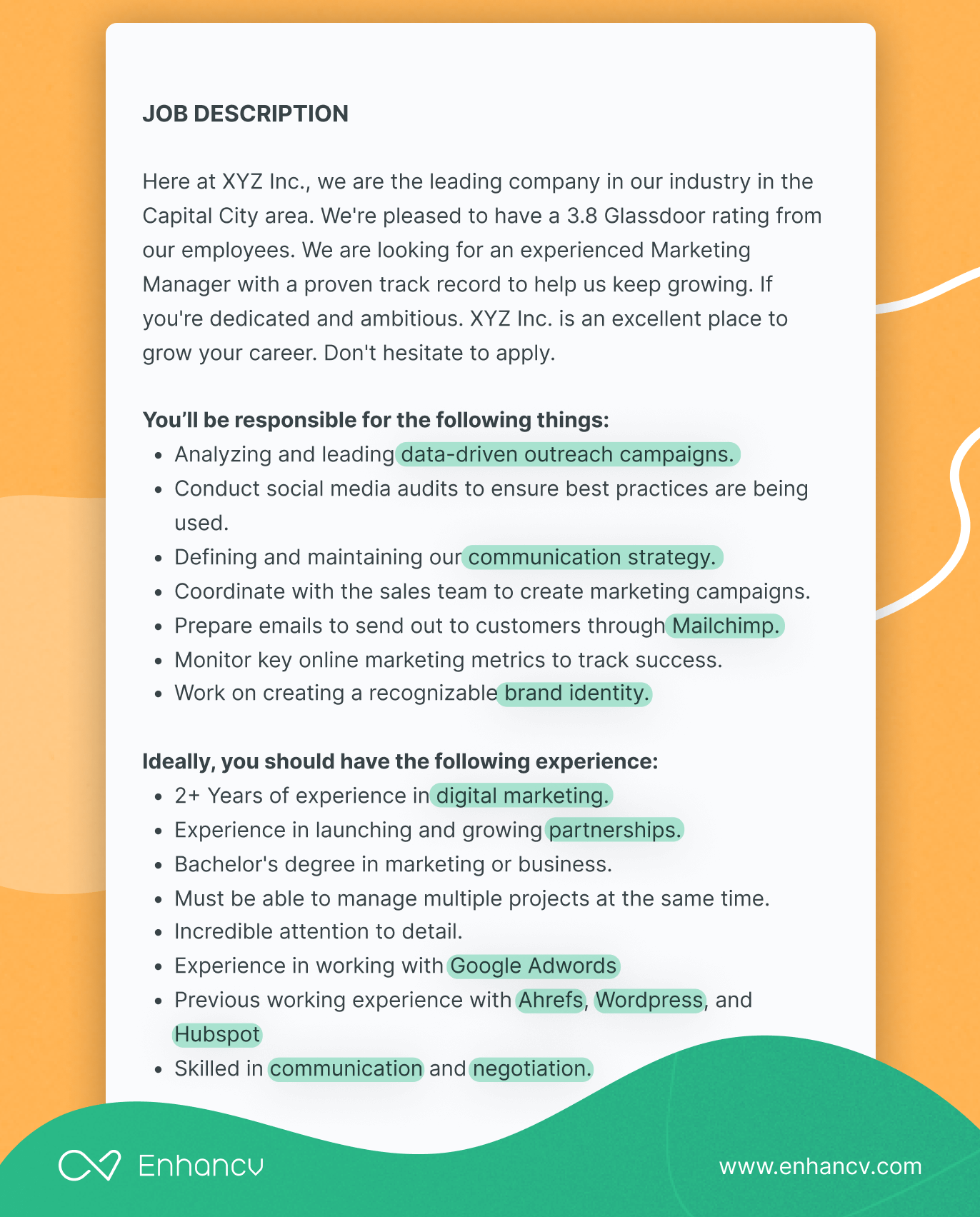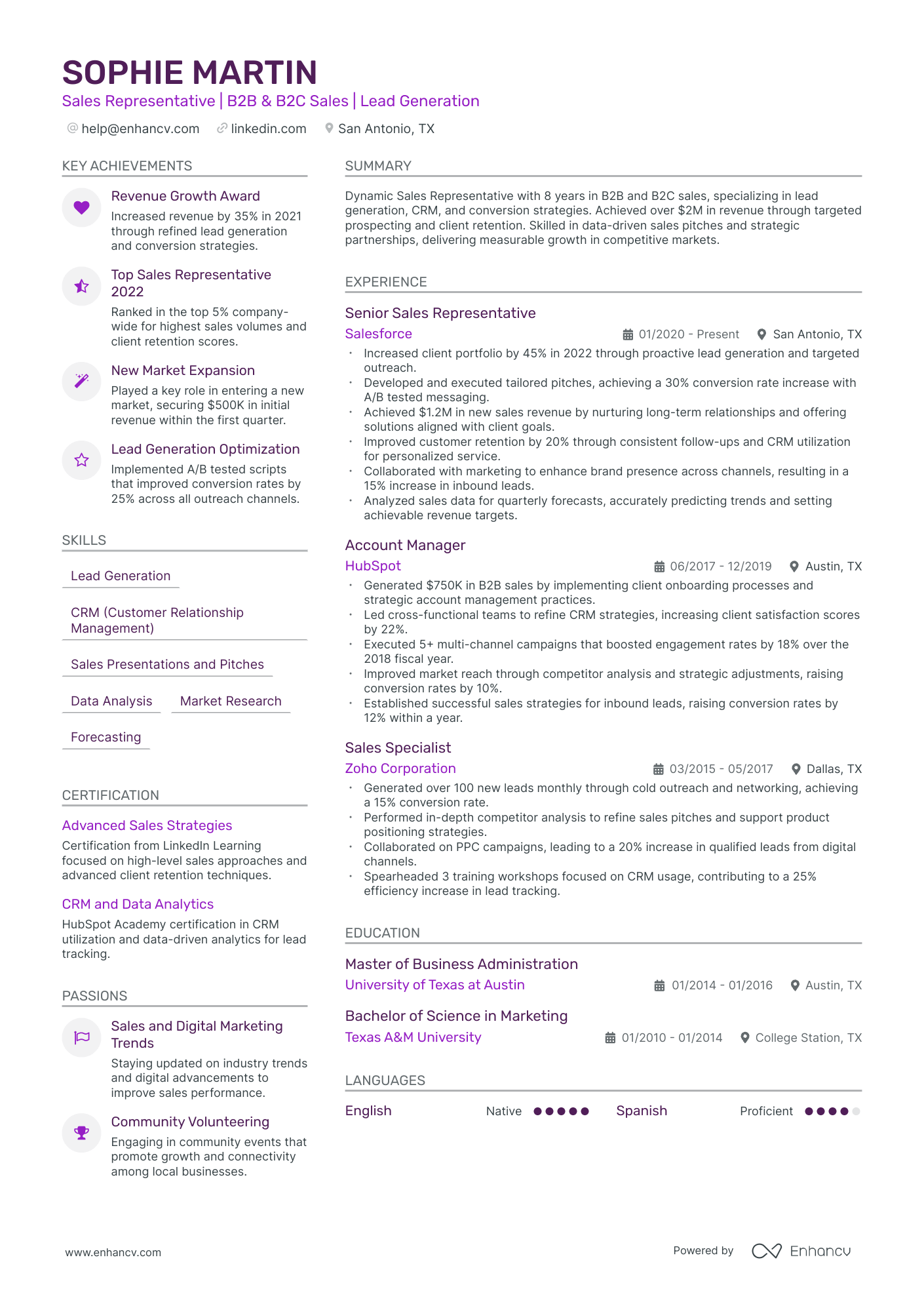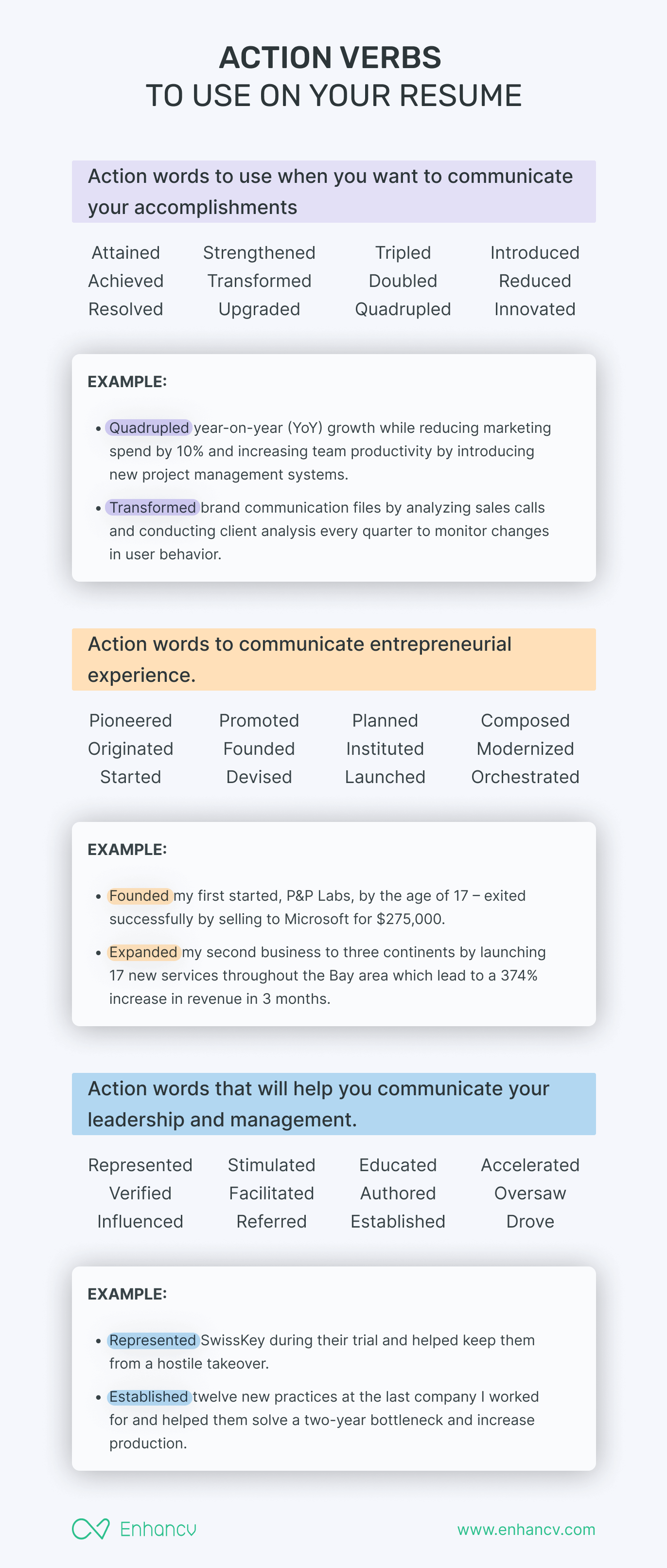Just as a good story needs the perfect words to capture readers, you need specific keywords on your resume to capture the attention of recruiters. Companies rely on ATS (Applicant Tracking Systems) to help them filter through applications, so strategically incorporating key phrases and terms can be the difference between landing an interview and being overlooked.
The big questions are: What are the right keywords? How do you find them, and where should you place them in your document? Are there words you shouldn’t include in your resume? This guide will answer these common questions, showing you how to optimize your application to stand out to both software programs and recruiters.
Key takeaways
- A resume keyword is an industry-specific term or phrase that makes your resume more appealing to recruiters and ATS.
- To find job-specific keywords, carefully review the job ad and look for any sought-after duties, soft and core skills, degrees, certificates, or awards worth featuring in your resume.
- Having a good keyword density is important but including too many can make your resume illegible for humans.
- Use keywords in different sections of your resume and avoid over-optimization.
- Buzzwords, jargon, and bragging keywords do the opposite of what resume keywords are meant for. Avoid them as much as possible to keep your chances of landing an interview high.
Let's get to it!
What are resume keywords?
Resume keywords are specific terms and phrases that highlight your qualifications, skills, and experience relevant to the job you’re applying for. A keyword can be an appropriate job title, duty, degree, or certificate. It could also be an ability, hobby, or interest the hiring company is looking for in an applicant.
Keywords are essential for optimizing your resume and increasing your chances of getting noticed by recruiters. Incorporate them throughout the summary, work experience, skills, education, and certifications sections. Avoid buzzwords, jargon, and arrogant keywords to maintain a professional and effective resume.
Keywords help you pass ATS
Using keywords on a resume is a relatively new trend in the hiring industry. Decades ago, especially before the widespread use of digital recruiting systems, recruiters focused more on the overall experience.
Today, things have changed—approximately 98% of Fortune 500 companies use ATS to screen out candidates and ease the hiring process. Thanks to ATS software, recruiting managers are no longer forced to read every single resume in their inbox.
Instead, headhunters will use ATS to scan applications for specific skills and qualifications. The tool will then shortlist a few final candidates that the hiring manager can check manually and call for an interview.
So here’s the deal—resume keywords are no longer a nice-to-have but a must-have for job hunters. If you want to maximize your chances of getting noticed, you need to optimize your resume with carefully chosen language.
How to find industry-specific keywords to build a better resume
Finding the best keywords for your resume can be tricky, but we’ve prepared some strategies to handle this challenge.
We’ve highlighted the keywords in this job posting:
Scanning the job posting for keywords
The most effective way to pass resume screening software is to reverse-engineer the hiring process. Start by skimming the job ad to identify terms and key phrases specific to the position or industry. Carefully read each section—the company overview, responsibilities, qualifications, and requirements.
This approach works because you’ll be using the company’s own language and terminology. You don’t have to guess which terms to use or how to describe yourself.
AI search for keywords
Modern problems require modern solutions, so consider using AI search engines to help you identify and optimize keywords in your resume.
Here are some strategies:
- Analyze job descriptions with AI tools like ChatGPT to extract important keywords and phrases for tailoring your resume.
Here’s a simple prompt:
Analyze the following job posting.
[insert the job description here]
Then, identify the most important keywords, skills, qualifications, and responsibilities relevant to the position. Highlight any recurring terms or phrases related to technical skills, tools, certifications, or soft skills. Provide a list of these keywords and phrases to help tailor a resume that aligns closely with this role.
- Use AI-based job search assistants (e.g., LinkedIn, Google for Jobs) to match you with jobs and highlight the best keywords.
- Take advantage of our free resume checker—for each resume uploaded, we look for skills and keywords related to the role and industry you’re applying for.
Is your resume good enough?
Drop your resume here or choose a file. PDF & DOCX only. Max 2MB file size.
So far, you've learned what resume keywords are, why they’re important, and how to find them. Now, it’s time to practice using job-relevant keywords in your resume.
How to use keywords in your resume
The key to using these effectively on your resume is to approach it strategically, avoiding keyword stuffing that could hurt readability. Focus on integrating relevant terms naturally throughout your document.
Here are three essential rules to keep in mind when adding keywords to a resume:
Spread keywords through different sections
Ensure that keywords are evenly distributed throughout your application in different resume sections as you never know which component a recruiter will review first. Doing this allows you to incorporate a wide range of terms where they fit naturally.
You don’t need to list “Python programming” under job responsibilities if it fits better in the “Skills” area.
Make sure your resume content flows
Many keywords will naturally appear in your resume as you describe your skills and experience, and your current document may already be optimized.
However, sometimes certain keywords can feel forced or out of place. In these cases, consider using the optional sections in the Enhancv resume builder, like “Projects,” “Awards,” or “Books,” to integrate them more smoothly. You can even create a custom segment tailored to your needs.
As a rule of thumb, prioritize the human reader’s experience when crafting your resume. While passing the ATS is essential, the ultimate goal is to engage a recruiter. Resumes with the highest success rates strike a careful balance between being ATS-friendly and appealing to human readers.
Avoid over-optimization
One of the most common mistakes for beginners is over-optimization. A job seeker learns about keywords and thinks, “The more I optimize my resume, the higher my chances of getting interviews are.”
While keyword density does matter in your resume, providing an optimal reading experience is more important. You don’t want to include too many keyphrases just to beat ATS. That might leave a negative impression on hiring managers.
The best way to optimize a resume for keywords is to reorder your list based on relevance and importance. Feel free to leave out terms you can’t find a natural place for.
PRO TIP
You shouldn’t use any single keyword more than once or twice in your resume. If necessary, look for synonyms and related terms you can apply interchangeably to avoid repetition.
Тypes of keywords you must avoid in your resume
Throughout this guide, we’ve defined good keywords for a resume as expressive and relevant to the job position. They portray who you are to the hiring company within a relevant context.
However, some phrases can actually be bad for your resume. The language on your resume isn’t just about relevance—it influences how you’re perceived as well. To avoid triggering negative reactions, steer clear of the following types of keywords.
Buzzwords
Buzzwords are trendy or overused phrases that often lose meaning due to excessive or vague usage, especially in professional contexts like resumes. These terms are meant to sound impressive but can come across as empty or insincere when not backed up with specific examples or substance.
The recruiter handling your application has read thousands of resumes in their lifetime. They've evaluated enough candidates to see every single clichéd description or overused term out there. So when they see buzzwords in a resume, they'll be quick to form a negative impression.
PRO TIP
Not only are buzzwords overused, but they also sound generic most of the time. Expressions like specialist, innovative, and strategic often only add confusion and make your resume less clear.
Jargon keywords
Jargon keywords are industry-specific terms that may be unfamiliar to non-specialists. While hiring managers will most likely be aware of the professional jargon, ATS might not, so it’s best to minimize and keep your resume accessible.
We get it—you want to show you understand the industry language but be cautious of an attempt to show off turning into a weakness on your resume.
PRO TIP
To make sure you’re not using jargon, ask a friend or a family member to read your resume. Even if the use of jargon terms is necessary, you should try and use more popular terms or easier synonyms that anyone can grasp.
Arrogance keywords
It's one thing to show what you're capable of and the potential you'll bring to the table. It’s another to only speak about individual career wins and glory.
Bragging on your resume can easily make you look overqualified or too arrogant for any employer’s taste. That's especially true if you focus too much on your personal involvement in tasks instead of showing you’re a team player and a good collaborator.
PRO TIP
Avoid using personal pronouns on a resume. This helps convey to recruiters you’re focused on contributing to the company’s goals and future, not just fulfilling your own ambitions.
The right way to show your strengths when applying for a job is to balance individual success with company achievements. You want to prove your worth as an employee by establishing clear cause-and-effect between your input and your previous employers’ growth.
Resume keywords examples
In this section, we’ve compiled examples of the best keywords to make your resume more attractive and memorable. While the list of potential key terms is vast, the right ones will depend on your profession, position, industry, and even location, as relevance is key.
There’s often some overlap in language across different roles—many action verbs, personality traits, core competencies, and achievements are applicable across various industries. However, you can always tailor a unique combination of keywords that sets you apart and makes you a sought-after candidate.
Action verbs to use in the experience section
Action verbs on your resume describe what you did or do in your role within a company. They can serve as an illustration of your initiative and impact. Also known as power words, these sound dynamic and effectively engage the reader. The best way to utilize these is to sprinkle them throughout your experience section when describing your work achievements.
For more detailed information on how to best do this and for a more comprehensive list of examples, check out our page on action verbs.
Action verb examples
- Achieved
- Developed
- Implemented
- Increased
- Improved
- Managed
- Optimized
- Spearheaded
- Supervised
- Transformed
Soft skills
Soft skills reflect how effectively you interact with others and contribute within a team. They’re essential for any role, as strong interpersonal abilities can enhance your work experience and positively shape how colleagues perceive you.
Best soft skills to use as resume keywords
- Adaptability
- Attention to detail
- Collaboration
- Communication
- Conflict resolution
- Creativity
- Emotional intelligence
- Leadership
- Problem-solving
- Teamwork
Plenty more examples await on our soft skills page.
Keywords to use to describe yourself on a resume
The way you present yourself can significantly strengthen your application. By selecting key phrases and impactful words to describe your strengths, personality, and professional style, you can make your resume and cover letter more compelling and memorable to employers.
Best resume keywords to describe yourself
- Charismatic
- Compassionate
- Decisive
- Dependable
- Ethical
- Imaginative
- Observant
- Persistent
- Rational
- Self-motivated
Check out more words to describe yourself by in your resume and cover letter.
Resume keywords by industry
Different industries prioritize unique qualities, so tailoring your language to match each field can make your application more effective. Let’s explore some of the best words for various industries.
Graphic design skills for your resume
- Adobe Creative Suite
- Branding
- Figma
- Illustrator
- Layout
- Photo editing (Photoshop)
- Prototyping
- Typography
- UI (User Interface)
- UX (User Experience)
Sales & marketing skills
- A/B Testing
- Analytics tools
- Brand management
- Campaign management
- Content marketing
- CRM (Customer Relationship Management)
- Data analysis
- Email marketing
- Lead generation
- SEO (Search Engine Optimization)
Most sought-after IT skills for resumes
- Agile development
- AWS (Amazon Web Services)
- Cloud computing
- Cybersecurity
- Data analytics
- DevOps
- JavaScript
- Machine learning (ML)
- Python
- SQL
Languages on a resume
Language skills on a resume demonstrate your ability to communicate across cultures—a valuable asset in today’s globalized workplace. They also show commitment to continuous learning and have multiple benefits on our brains’ cognitive function, such as improved concentration and better working memory.
Here are some of the most popular languages you can include in your resume:
Language keywords for resumes
- English
- Mandarin Chinese
- Spanish
- Arabic
- French
- German
- Portuguese
- Japanese
- Russian
- Hindi
- Korean
Certifications for your resume
Adding certifications to your resume highlights your commitment to professional development and can set you apart from other candidates. Relevant certifications can also act as keywords, enhancing your resume’s compatibility with ATS.
Let’s review some popular certifications:
Career-boosting certifications to put in a resume
- Adobe Certified Expert (ACE)
- AWS Certified Solutions Architect
- Certified Digital Marketing Professional (CDMP)
- Certified ScrumMaster (CSM)
- Information Technology Infrastructure Library (ITIL) Certification
- Microsoft Certified: Azure Fundamentals
- Microsoft Office Specialist (MOS)
- Project Management Professional (PMP)
- Salesforce Certified Administrator
- Six Sigma Green Belt
You can browse through our dedicated certifications page, where we discuss additional training by industry.
Conclusion
Mastering the use of keywords on your resume is a game-changer for getting noticed by both ATS systems and recruiters. With the right keywords, you'll boost your chances of landing interviews and showcasing your unique qualifications, setting yourself apart from the competition.
Make one that's truly you.







